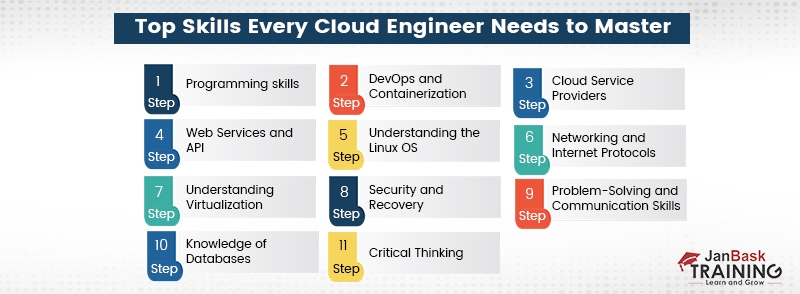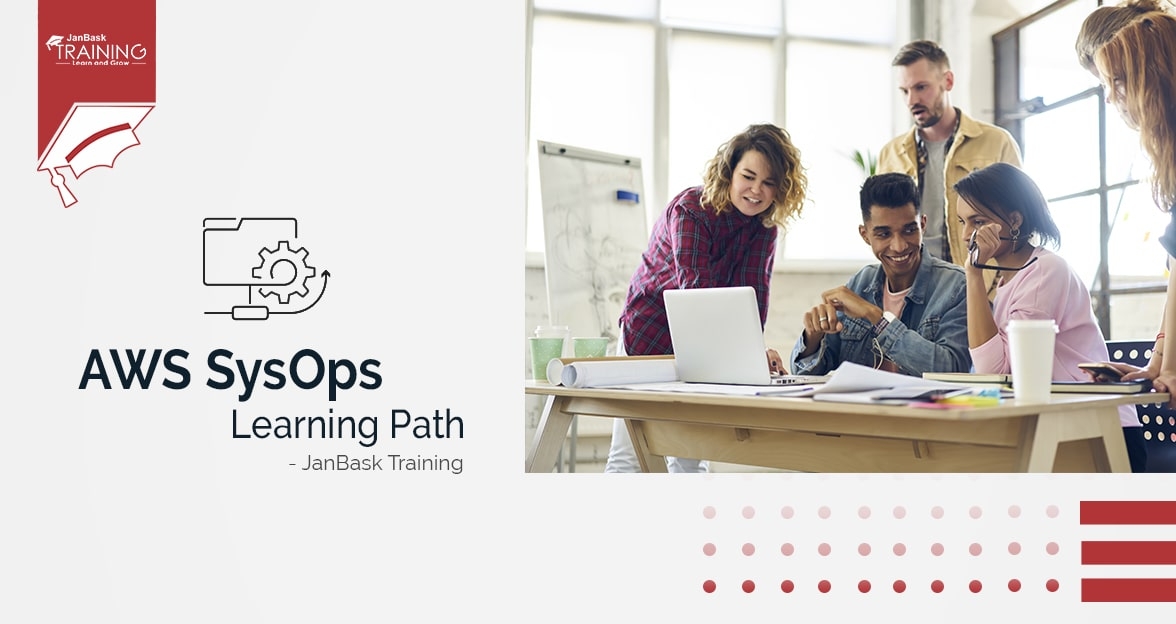Introduction
Cloud computing has gained widespread popularity, and according to Exploding Topics - ‘As of 2023, the cloud applications market is valued at approximately $153.6 billion.’ As a result, there is an increasing demand for certified cloud engineers with relevant skill sets in the field.
By 2025, it is predicted that over 100 zettabytes of data will be stored in the cloud. As a cloud engineer, your role will involve managing and optimizing the performance, security, and stability of cloud systems and working with other teams to ensure smooth operation. To be successful as a cloud engineer, you’ll need to have industry specific technical skills, including knowledge of cloud infrastructure, network architecture, and programming languages.
These skills are necessary for cloud engineers to beat the competition and remain relevant in this rapidly advancing decade. These can only be acquired with years of experience or by enrolling in a cloud computing course.
Through this blog post, we aim to offer you guidance for the key skills you should learn to become a successful cloud engineer, including understanding cloud architecture and deployment models and mastering programming languages and automation tools.
Why Should You Upskill as a Cloud Engineer?
Do you feel like the skills you currently possess are no longer keeping you on the cutting edge? Do you worry that your current skills might not be enough to help you stay relevant and competitive? If these thoughts often cross your mind, it may be time for you to consider upskilling. If you are still not sure about enrolling in a cloud computing online training to advance your skills, here are some additional benefits to consider:
- Upskilling can help you stay current with industry trends and technologies, which is essential for staying competitive in the job market.
- Expanding your skillset can increase your value as an employee and make you more attractive to potential employers.
- Upskilling can also lead to increased earning potential as you become more valuable to your current or future employers.
- Learning new skills can also help you take on new and more challenging tasks, which can lead to increased job satisfaction.
- Upskilling can also open up opportunities to work on a wider range of projects and industries.
Overall, upskilling is an important investment in your career that can help you stay competitive, increase your value as an employee, and improve your job satisfaction. As a beginner developing these skills at the start of your career can help you reach new heights and advance your career. Keep reading to know more about these skills.
The Top 11 Skills Every Cloud Engineer Needs to Master

Here is a list of 11 skills that every aspiring or experienced cloud computing engineer must possess to build a successful career in the industry. If you are an aspiring cloud engineer developing these skills is highly valued by employers and can help you stand out in the job market.
1. Programming Skills
As a cloud engineer, it's important to have a strong foundation in programming, as this will enable you to build and manage cloud-based systems more effectively. Some programming skills that are particularly valuable for cloud engineers include:
- Python: Python is a popular programming language widely used in cloud computing, as it is easy to learn and has a large, active community of users. Python is utilized for the widest variety of tasks in cloud engineering, including automation, data processing, and machine learning. A comprehensive Python programming tutorial will help you understand basic to advanced concepts of this language.
- Java: Java is another commonly used programming language in the cloud engineering field. It is a powerful, object-oriented language that is well-suited for building scalable, distributed systems.
- C++: C++ is a high-performance programming language often used in cloud computing to build custom tools and optimize system performance.
- Bash/Shell scripting: Bash and other shell scripting languages automate tasks and manage systems in cloud environments.
In addition to these languages, it can also be helpful to have experience with other programming languages, such as C#, Ruby, or Go, as well as with frameworks and libraries that are commonly used in cloud computing, such as AWS SDK, Google Cloud Client Libraries, and Azure SDK. Strong programming skills will enable you to build and manage cloud-based systems more effectively and make you a valuable asset to your team and organization.
2. DevOps and Containerization
It is important for a cloud engineer to have a strong understanding of DevOps principles and practices, as well as knowledge of containerization technologies such as Docker.
DevOps implies a set of practices that aims to improve collaboration and communication between software development and IT operations teams, to deliver software updates and applications faster and more reliably. It involves using automation, monitoring, and testing tools to streamline the software delivery process and reduce the time it takes to go from code development to deployment. A DevOps tutorial will help you acquire detailed knowledge of it.
Containerization is a way of packaging and deploying applications in a consistent and portable manner using containers. Containers allow you to package an application and its dependencies into a single, self-contained unit, easily moving between different environments, such as from a developer's laptop to a test environment or from a test environment to production. Docker is a popular containerization platform that allows you to build, run, and manage containers.
DevOps practices and containerization technologies in the cloud are often used together to enable a more agile and efficient software delivery process. For example, you might use a continuous integration and delivery (CI/CD) pipeline to automate your application's build, test, and deployment, with containers being used for packaging and deploying the application.
3. Cloud Service Providers
As a cloud engineer, you must understand the various cloud service providers (CSPs) and their services. This includes both infrastructures as a service (IaaS) providers, such as Amazon Web Services (AWS), Microsoft Azure, and Google Cloud Platform (GCP), and platform as a service (PaaS) providers, such as Heroku and Cloud Foundry.
Each CSP offers a different set of services. It is important for a cloud engineer to understand the capabilities and limitations of these services, as well as how they can be used to build and deploy applications in the cloud.
In addition to knowing the various CSPs and their services, it is also important for a cloud engineer to be familiar with the tools and technologies used to manage and automate the deployment and management of applications in the cloud. This may include configuration management tools such as Ansible and Terraform and container orchestration tools such as Kubernetes.
4. Web Services and API
As a cloud engineer, you must understand web services and APIs (application programming interfaces). Web services are a way of providing access to functionality and data over the internet. They allow applications to communicate with each other and exchange data and functionality in a platform-agnostic manner using standard protocols such as HTTP and XML.
APIs are a way of exposing the functionality of a web service to external consumers. They define the methods and parameters used to interact with the service and often include documentation and examples to help developers understand how to use the service.
In the cloud, web services and APIs are often used to enable a wide range of scenarios, such as communication between different cloud-based applications or providing access to data and functionality to external developers.
As a cloud engineer, it is critical to understand web services and APIs, including how to design, implement, and consume them. This may involve knowledge of REST (Representational State Transfer) and SOAP (Simple Object Access Protocol) and tools and frameworks for building and consuming APIs, such as Swagger and Postman. Clear all your doubts about the REST API wrapper here.
5. Understanding the Linux OS
If you want to build a career as a cloud engineer, you must have a strong understanding of the Linux operating system (OS). Linux is a widely-used, open-source operating system that powers a large number of servers and devices around the world. In the cloud, Linux is often used as the underlying OS for infrastructure as a service (IaaS) offerings, such as Amazon Web Services (AWS) and Microsoft Azure.
Having a strong understanding of Linux is important for a cloud engineer for several reasons. Including that many cloud-based services and tools are built on top of Linux, and knowledge of the OS is necessary to use and manage these tools effectively. Knowledge of Linux is essential for troubleshooting and debugging issues that may arise in the cloud. Also, understanding Linux is an important skill for building and deploying applications in the cloud, as many cloud-based application hosting platforms, such as Heroku and Cloud Foundry, are built on top of Linux.
6. Networking and Internet Protocols
As a cloud computing engineer, it is important to have a strong understanding of networking and internet protocols.
Networking refers to the technologies and practices used to connect computers and devices over a network, such as an internet. This includes knowledge of different networking protocols, such as TCP/IP (Transmission Control Protocol/Internet Protocol), and technologies for routing and switching data between devices.
Internet protocols are the rules and standards that define how data is transmitted. These include protocols such as HTTP (Hypertext Transfer Protocol) and HTTPS (HTTP Secure), which are used for communication between web servers and clients, and FTP (File Transfer Protocol), which is used for transferring files between computers.
In the cloud, networking and internet protocols are essential for connecting and communicating between different cloud-based resources and services. For example, knowledge of networking protocols is necessary for setting up and configuring virtual private clouds (VPCs) and virtual networks. Internet protocols are essential for building and consuming web services and APIs.
7. Understanding Virtualization
As a cloud engineer, it is important to have a strong understanding of virtualization and what full virtualization is ideal for in cloud computing to run the systems smoothly.
Virtualization refers to creating a virtual version of something, such as a computer, a server, or a network, that can be accessed and used as if it were a real, physical resource. Virtualization allows you to create and run multiple virtual resources on a single physical host, enabling you to use and manage computing resources.
Virtualization enables a wide range of scenarios in the cloud, such as creating and running virtual machines (VMs), setting up and configuring virtual networks, and creating and managing virtual storage.
As a cloud engineer, it is important to have a strong understanding of virtualization technologies and practices, including creating and managing virtual resources and troubleshooting and debugging issues that may arise in a virtualized environment.
8. Security and Recovery

As a cloud engineer, it is important to have a strong understanding of security and recovery practices.
Security in the cloud refers to the measures and practices used to protect cloud-based resources and data from unauthorized access or attacks. This includes knowledge of security best practices, such as using encryption and implementing access controls, as well as tools and technologies for detecting and responding to security threats.
Recovery refers to the processes and practices used to restore access to cloud-based resources and data in the event of a failure or disruption. This includes knowledge of disaster recovery and business continuity best practices, tools, and technologies for backing up and restoring data.
Security and recovery are critical considerations in the cloud, as cloud-based resources and data are often mission-critical and must be highly available. As a cloud engineer, it is important to have a strong understanding of security and recovery practices and to be able to implement and maintain them effectively.
9. Problem-Solving and Communication Skills
Strong problem-solving and communication skills are essential for cloud engineers. You will create, build, and maintain complex systems as a cloud engineer. You will often need to troubleshoot and resolve issues that arise, which requires strong problem-solving skills.
Effective communication is also important for cloud computing engineers. You must work closely with team members and stakeholders to understand their needs and communicate your plans and progress. You may also need to document your work and explain technical concepts to non-technical audiences. Good problem-solving and communication skills can help you more effectively solve issues and collaborate with others, leading to better outcomes and more efficient work. Employers also highly value these skills and can help you stand out in the job market.
10. Knowledge of Databases
As a Cloud Engineer, you must help businesses transfer their database onto the cloud. For that, you must know about data storage and migration. Prior to the cloud, many organizations used to store their databases in a physical center, which was expensive. Migrating a database to the cloud means there’s no physical limit to the amount of data you can store; it also saves money since there’s no need to invest in physical servers or data storage devices.
11. Critical Thinking
As a Cloud Engineer, you’ll need to resolve daily issues, for which you’ll have to think of the best possible solution. You must think creatively to help resolve your employer’s issues by offering cost-effective, efficient, and less time-consuming solutions. From day to day, your critical thinking skills will be tested using diagnosing problems, testing and debugging cloud integrations, knowing risk mitigations inside the cloud security, and consistent strategy planning for optimization of the cloud infrastructure.
Career Options With Cloud Computing Skills
Cloud computing skills offer different career prospects, comprising different job roles: IT, management, application development, business analysis, network, security, web development, and many more. As you know, jobs in this sector are continuously growing; a few of the most popular jobs include
- Cloud Engineer
- Cloud Project Manager
- Cloud Architect
- Cloud Developer
- Cloud Administrator
- Cloud Consultant
- CIO
The aforementioned list of job roles is explicatory and not comprehensive. There’s a dramatic rise in the hiring of cloud engineers in the top MNCs such as Amazon, Google, IBM, Microsoft, etc., in their cloud framework.
It’s also expected that the demand for cloud computing professionals is further going to increase by leaps and bounds in the coming years, and so does the need for the jobs such as cloud engineers.
Conclusion
This brings us to the end of this blog: how to become cloud engineer and the skills required for cloud engineer. You can use several resources to learn more about cloud computing, and thus can be beneficial in your pathway to becoming a successful cloud engineer. Another best option is to enroll in cloud computing training and certification programs.
Attaining these certifications differentiates your profile from the rest and allows you to become the most sought-after cloud engineer in this highly competitive job market. This training and certification course will help you gain in-depth knowledge of the cloud computing skills required, helping you carve a successful cloud engineer career!
But if you’re interested in starting your career in the Cloud Engineer role and wondering how you can go about it, then we’ve exactly what you need. Check out the cloud computing training course by JanBask Training to kick-start your career!
FAQs
Q1. What is Cloud Computing?
Ans: In short, Cloud computing includes delivering various services over the internet. It could be anything, like accessing and storing programs and data, security measures, analytics, and other tasks.
Q2. Who can take up Cloud Computing Training?
Ans: This cloud computing training course covers the basics and advanced concepts of cloud computing. Candidates will learn about cloud architecture, services, hosting, and more. The following individuals can take up this course
- Product managers
- Systems administrators
- IT administrators
- IT engineers
- Cloud engineers
- IT managers
- Software developers,
- Software architects
Q3. How can Beginners Learn Cloud Computing Skills?
Ans: Beginners who wish to learn cloud computing can begin with the fundamentals first, and once they’ve mastered the fundamentals, they can move on to the advanced topics.
Q4. What are the Roles and Responsibilities of Cloud Computing Professionals?
Ans: As a cloud computing professional, you’ll have the following roles and responsibilities:
- Identifying excellent cloud solutions by working with cloud engineering and development teams.
- Identifying, analyzing, and resolving application installation problems and infrastructure vulnerabilities.
- Offer cloud support and make improvements and recommendations on the same.
- Improve and modify current systems.
- Design, develop, and deploy compatible cloud computing systems.
- Train teams on the current cloud technologies skills and their implementation.
- Resolve technical defects and discover future threats.
- Select the right service to fulfill the organization’s needs.
- Calculate business expenses.
Q5. What are the Benefits of Learning Skills for Cloud Computing?
Ans: Cloud computing is one of the leading technologies today. Here you’ll learn the following skills for cloud computing
- Flexible Migration
- Excellent Performance
- Resiliency in Workload
- Improved Agility and Speed
- Follows the pay-as-you-go feature
- Highly Flexible
- Reduces Business Expenses
Because of this, the demand for cloud computing professionals has increased tremendously. Therefore, to become a part of popular organizations, you must have an in-depth knowledge of this technology. Enroll today in our cloud computing training courses!
Q6. What are the Job Opportunities Available After Completing These Courses?
Ans: A few of the most in-demand job roles available after the completion of the cloud computing training courses include:
Q7. Give a Comprehensive Overview of Your Cloud Computing Training Courses?
Ans: Our cloud computing training courses will help you learn how to design, install and manage cloud-based systems. Through our courses, you’ll learn to install cloud security solutions to protect against any threat.
Q8. What are the Features of Your Cloud Computing Training Courses?
Ans: Our cloud computing training courses will take you through a step-by-step approach while learning Cloud Computing concepts. Here are the features of our courses
- Instructor-led cloud computing classes
- Self-paced video sessions to master your learning
- Lifetime access to learning material
- Industry-recognized course completion certificate
Q9. What are the Eligibility Criteria for Enrolling in your Cloud Computing Training Courses?
Ans: Candidates who wish to take up these courses must possess a bachelor’s degree or an equivalent degree for admission. Professionals with a basic knowledge of networking can apply for career advancement opportunities.
Q10. After Completing the Cloud Computing Courses, Where can Candidates Apply?
Ans: Candidates can apply for the following exams after completing the certification course
- Microsoft Azure advanced Exam,
- Cisco Certified Internetwork Expert Cloud,
- VMware Certified Professional 6 - Cloud, and many more.
AWS Course
Upcoming Batches
Trending Courses
Cyber Security
- Introduction to cybersecurity
- Cryptography and Secure Communication
- Cloud Computing Architectural Framework
- Security Architectures and Models
Upcoming Class
2 days 30 Dec 2025
QA
- Introduction and Software Testing
- Software Test Life Cycle
- Automation Testing and API Testing
- Selenium framework development using Testing
Upcoming Class
1 day 29 Dec 2025
Salesforce
- Salesforce Configuration Introduction
- Security & Automation Process
- Sales & Service Cloud
- Apex Programming, SOQL & SOSL
Upcoming Class
-1 day 27 Dec 2025
Business Analyst
- BA & Stakeholders Overview
- BPMN, Requirement Elicitation
- BA Tools & Design Documents
- Enterprise Analysis, Agile & Scrum
Upcoming Class
12 days 09 Jan 2026
MS SQL Server
- Introduction & Database Query
- Programming, Indexes & System Functions
- SSIS Package Development Procedures
- SSRS Report Design
Upcoming Class
-1 day 27 Dec 2025
Data Science
- Data Science Introduction
- Hadoop and Spark Overview
- Python & Intro to R Programming
- Machine Learning
Upcoming Class
-1 day 27 Dec 2025
DevOps
- Intro to DevOps
- GIT and Maven
- Jenkins & Ansible
- Docker and Cloud Computing
Upcoming Class
5 days 02 Jan 2026
Hadoop
- Architecture, HDFS & MapReduce
- Unix Shell & Apache Pig Installation
- HIVE Installation & User-Defined Functions
- SQOOP & Hbase Installation
Upcoming Class
5 days 02 Jan 2026
Python
- Features of Python
- Python Editors and IDEs
- Data types and Variables
- Python File Operation
Upcoming Class
6 days 03 Jan 2026
Artificial Intelligence
- Components of AI
- Categories of Machine Learning
- Recurrent Neural Networks
- Recurrent Neural Networks
Upcoming Class
-1 day 27 Dec 2025
Machine Learning
- Introduction to Machine Learning & Python
- Machine Learning: Supervised Learning
- Machine Learning: Unsupervised Learning
Upcoming Class
12 days 09 Jan 2026
Tableau
- Introduction to Tableau Desktop
- Data Transformation Methods
- Configuring tableau server
- Integration with R & Hadoop
Upcoming Class
1 day 29 Dec 2025






















Kaden Brown
I found this blog on the skills needed for cloud engineering to be extremely helpful. As someone considering a career in the field, it was great to get a clear understanding of the various skills necessary to succeed.
JanbaskTraining
Hello, and many thanks. We are happy that you found our blog to be informative. Contact us at https://www.janbasktraining.com/contact-us for more information.
Paul Wilson
The information on the importance of skills like programming, security, and recovery was particularly valuable. Thank you for sharing this valuable resource!
JanbaskTraining
Hi, We appreciate your comment.
Omar Moore
I am a current cloud engineer and found this blog to be a great reminder of the diverse skills necessary to excel in this field.
JanbaskTraining
I'm glad this was helpful. Visit JanBask Blogs to read along with us and get more information on your favorite subjects!
Brian Taylor
The emphasis on continuous learning and staying up-to-date on the latest technologies was particularly resonant. Great job on this informative and useful piece!
JanbaskTraining
Hello, and many thanks. We are happy that you found our blog to be informative. Contact us at https://www.janbasktraining.com/contact-us for more information.
Louis Anderson
As someone who is just starting to explore a career in cloud engineering, this blog was a great introduction to the skills and knowledge needed to succeed in the field.
JanbaskTraining
I'm glad this was helpful. Visit JanBask Blogs to read along with us and get more information on your favorite subjects!
Caden Thomas
I will definitely use this as a guide as I build my skill set.
JanbaskTraining
I'm glad this was helpful.
Maximiliano Jackson
I appreciated the breakdown of the different technical skills necessary for cloud engineering. It was eye-opening to see just how diverse the skill set for this role is.
JanbaskTraining
Hello, and many thanks. We are happy that you found our blog to be informative. Contact us at https://www.janbasktraining.com/contact-us for more information.
Holden White
I will be using this blog as a reference as I work to develop my skills and advance my career in cloud engineering.
JanbaskTraining
Hello, and many thanks. We are happy that you found our blog to be informative. Contact us at https://www.janbasktraining.com/contact-us for more information.
Paxton Harris
This blog was a great resource for understanding the various skills necessary to succeed as a cloud engineer.
JanbaskTraining
I'm glad this was helpful. Visit JanBask Blogs to read along with us and get more information on your favorite subjects!
Nash Martin
A great read!
JanbaskTraining
Hi, We appreciate your comment.